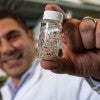
‘Drug factory’ implants eliminate ovarian, colorectal cancer in mice
Rice bioengineers have created tiny implants that activate immune cells to destroy cancer.

‘Drug factory’ implants eliminate ovarian, colorectal cancer in mice
Rice bioengineers have created tiny implants that activate immune cells to destroy cancer.

Inaugural class of Rice Innovation Fellows announced
The Provost’s Office and the Liu Idea Lab for Innovation & Entrepreneurship (Lilie) have announced the inaugural class of Rice Innovation Fellows, a program that will provide educational and financial support to the next generation of scientist- and engineer-led spinout ventures.

CPRIT supports work on combo cancer therapy
Rice University bioengineer Gang Bao is developing a three-pronged attack on solid cancer tumors. The research now has the support of the Cancer Prevention and Research Institute of Texas.

Rice team’s mask strategy passes muster
During the early stages of the COVID-19 pandemic, a team at Rice University went looking for and found a way to make standard surgical masks better at keeping out small airborne droplets that might contain the SARS-CoV-2 virus.

‘Lefty’ tightens control of embryonic development
A protein known as Lefty pumps the brakes as human embryos begin to differentiate into the bones, soft tissues and organs that make us.

Antibody with engineered peptide targets bone metastasis
A moderate amount of a peptide-enhanced cancer drug goes a long way in treating breast cancers that metastasize to the bone.

Four faculty members and their collaborators win Advanced Research Projects Agency for Health seed grants.
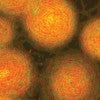
Swirling bacteria mimic Van Gogh’s ‘The Starry Night’
Scientists discovered a way to transform millions of predatory bacteria into swirling flash mobs reminiscent of painter Vincent Van Gogh’s “The Starry Night” as the unexpected result of experiments on a genetic circuit the creatures use to discern friend from foe.

Rice’s Technology Development Fund backs faculty projects
Nine projects proposed by Rice researchers have been granted seed funding by Creative Ventures' Technology Development Fund.
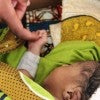
NEST360 wins 2021 Innovating for Impact Partnership Award
NEST360, an international alliance with roots at Rice University’s Rice 360º Institute for Global Health, has won the Global Health Technologies Coalition 2021 Innovating for Impact Partnership Award for its efforts to end preventable newborn deaths in African hospitals.
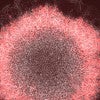
NSF grant supports study of cells’ early decisions
Rice University receives National Science Foundation support to build a model of cell differentiation during the earliest stage of life. The model could help improve researchers’ ability to direct stem cells to a given fate.

Rice profs among historic Greek heroes
Two Rice professors are among physicians and biomedical researchers honored on the Greece bicentennial.

Alvarez, Mikos elected to Chinese Academy of Engineering
Pedro Alvarez and Antonios Mikos have been elected to the Chinese Academy of Engineering.

Rice professor, grad student strike $45 million deal for startup
A startup biotech company founded by a Rice professor and a graduate student in 2018 has been acquired in a deal that could be worth as much as $400 million.
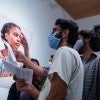
Baker College senior Magdah Omer debuted their first solo art exhibition Oct. 15 at Sleepy Cyborg.